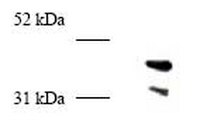PC474 Sigma-AldrichAnti-PCNA (247-261) (Ab-5) Rabbit pAb
This Anti-PCNA (247-261) (Ab-5) Rabbit pAb is validated for use in Immunoprecipitation for the detection of PCNA (247-261) (Ab-5).
More>> This Anti-PCNA (247-261) (Ab-5) Rabbit pAb is validated for use in Immunoprecipitation for the detection of PCNA (247-261) (Ab-5). Less<<Anti-PCNA (247-261) (Ab-5) Rabbit pAb MSDS (material safety data sheet) or SDS, CoA and CoQ, dossiers, brochures and other available documents.
同义词: Anti-Proliferating Cell Nuclear Antigen
Recommended Products
概述
| Replacement Information |
|---|
重要规格表
| Species Reactivity | Host | Antibody Type |
|---|---|---|
| H | Rb | Polyclonal Antibody |
价格及供货情况
| 产品目录编号 | 库存情况 | 包装 | 数量 / 包装 | 价格 | 数量 | |
|---|---|---|---|---|---|---|
| PC474-50ULCN |
|
塑胶安瓿;塑胶针药瓶 | 50 ul |
|
— |
| Product Information | |
|---|---|
| Form | Liquid |
| Formulation | Undiluted serum. |
| Positive control | MCF7 cells |
| Preservative | ≤0.1% sodium azide |
| Quality Level | MQ100 |
| Biological Information | |
|---|---|
| Immunogen | a synthetic peptide corresponding to amino acids 247-261 of human PCNA |
| Immunogen | Human |
| Host | Rabbit |
| Isotype | IgG |
| Species Reactivity |
|
| Antibody Type | Polyclonal Antibody |
| Physicochemical Information |
|---|
| Dimensions |
|---|
| Materials Information |
|---|
| Toxicological Information |
|---|
| Safety Information according to GHS |
|---|
| Safety Information |
|---|
| Product Usage Statements |
|---|
| Packaging Information |
|---|
| Transport Information |
|---|
| Supplemental Information |
|---|
| Specifications |
|---|
| Global Trade Item Number | |
|---|---|
| 产品目录编号 | GTIN |
| PC474-50ULCN | 04055977208337 |
Documentation
Anti-PCNA (247-261) (Ab-5) Rabbit pAb MSDS
| 职位 |
|---|
Anti-PCNA (247-261) (Ab-5) Rabbit pAb 分析证书
| 标题 | 批号 |
|---|---|
| PC474 |
参考
| 参考信息概述 |
|---|
| Miyachi, K., et al. 1990. J. Immunol. 121, 2228. Waseem, N.H. and Lane, D.P. 1990. Science 96, 121. Suzuka, I., et al. 1989. Proc. Natl. Acad. Sci. USA 86, 3189. Bravo, R., et al. 1987. Nature (London) 326, 515. Bravo, R. and MacDonald-Bravo, H. 1987. J. Cell. Biol. 105, 1549. |








